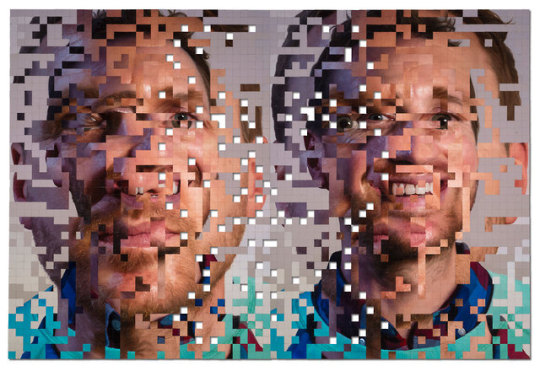Don't wanna be here? Send us removal request.
Photo

Identity Duality in the Age of Social Media - Abbey Lossing
0 notes
Text
I actually think that online personas will remain prominent and larger-than-life, despite the increased risk of exposure (or threat of people discovering that their persona and in-person demeanor is distant). The greatest benefit from the existence of online personas, and something I’ve experienced is that identity explored online encourages individuals to do the same in real life -- maybe they’ve discovered an uncharted aspect of themselves, or they were too afraid to be authentic before experimenting.
As internet/tech integrates into everything we do (augmented reality, for example), we may be granted the same abilities to edit, photoshop, and manipulate our real-life persona (and person: the ultimate avatar) as we can online via the computer. Many may object to this idea, with the notion that we are losing our natural selves. I’d argue that we are exploring, evolving, and finding new ways to manifest who we are.
0 notes
Text
The study “Online Deception: Prevalence, Motivation, and Emotion” centers around deception, which users are more likely to deceive others, and for which reasons.
It was found that, while most of the respondents believe that online deception is very widespread, only about one-third of them reported engaging in online deception. Frequent users deceive online more than infrequent users, young users more than old, and competent users more than non-competent. The most common motivations to deceive online were "play" on the one hand and privacy concerns on the other. Most people felt a sense of enjoyment while engaging in online deception.
It should be noted that the participants surveyed were only Israeli citizens, so it is unclear how generalizable this study is. Also, that “deception” is defined as “intentionally giving incorrect details” about oneself. There are negative connotations to the word that makes one think of criminal activity -- this is not what they are referring to.
If this study can be generalized, it might reveal the future of users on the internet. The demographic that “deceives” most often are young, computer-savvy and online frequently: the upcoming generation of individuals. They wear this “deception mask” because they have the skills to do it and it’s “fun” to explore within an anonymous realm. In a way, it’s like a baby learning to walk, then learning the many ways in which it can walk. I think more people would be deceptive in virtual space if they had the know-how and spent more time online.
https://www.liebertpub.com/doi/abs/10.1089/cpb.2006.9.54
0 notes
Photo

We met day one/In 13 Weeks I Never Saw Him Smile - Robin Eley
(An artist’s perspective on online identity)
0 notes
Text
In the article, “How Different are you Online and Offline Personalities”, the author raises a few good points about real-life and online identity over time – and makes me rethink an earlier statement about the future of online personas.
"Although our digital identity may be fragmented, it seems clear that our various online personas are all digital breadcrumbs of the same persona; different symptoms of our same core self "
This view is consistent with my own and reflects my previous comments. I also felt that this digital identity would grow more exaggerated and, at times, deceptive, as young and tech-savvy users frequent the internet. However, I read:
UK adults are now spending over 20 hours a week online: twice as much as 10 years ago. Similar metrics have been reported for the US…
Like in reality TV shows, it is harder to fake it online when you are being observed for a longer period of time. Conversely, deliberate deception and impression management are relatively straightforward during short-term interactions, such as job interviews, first dates and dinner parties. We all have a window for displaying the bright side of our personality and adhering to social etiquette, but what happens when a great portion of our lives is being broadcasted?
There is truth to the idea that the longer you are being watched, the more opportunities there are to reveal aspects of yourself; it becomes more difficult to hide. Therefore, those going for a more anonymous or deceptive approach online are going to “run out of steam” the longer they spend online, the more connected the internet becomes (in other words, the fewer places there are to hide), and the more the internet integrates into our life (adding more references or “breadcrumbs” leading back to the real user).
It’s hard to predict the future of online personas. Perhaps intentional deception and anonymity will subside, as it will be vain; it won’t be a challenge to hunt you down following your digital footprint. It may not deter those who deceive in short bursts to make a good impression, have fun or troll, but it could be bad news for online criminals and digital identity thieves.
https://www.theguardian.com/media-network/2015/sep/24/online-offline-personality-digital-identity
0 notes
Text
A study on Thai Facebook users, “Personal Identity and the Self in the Online and Offline World”, shows the liberty individuals take with creating a persona in conjunction with anonymity.
Many Thai Facebook users opt not to show their faces or their real names on their profile pages. Instead they are very creative in inventing new names for themselves which effectively prevents anybody from knowing who the real person behind the Facebook persona is. So, unless the person herself tells her friends who she really is, nobody would know who she is. Instead of putting up their own portrait on the profile as is originally intended by the very name ‘‘Facebook,’’ many in Thailand are putting up all kinds of pictures: Some put up pictures of their favorite pets; some put up a political banner complete with the Thai national flag; some use pictures of well-known cartoon personalities such as Winnie the Pooh, and so on. Furthermore, they are not using their real names in the profiles. Some call themselves ‘‘Laughing out Loud throughout the Field,’’ ‘‘Red Linguist,’’ ‘‘Dragon from the Plateau,’’ and so on. A recent practice has a result of the ongoing political conflicts in Thailand is that many put up the phrase ‘‘love the King’’ following their names to show their support for the King.
Before someone says, “These people aren’t showing their authentic selves,” I’d argue that these anonymous users likely reveal that they love animals, are prideful of their country, identify with a cartoon character, or show where they fall on the political spectrum. Interestingly, in Thailand, a person can be imprisoned for 15 years for expressing opposition to the King. An opposing user would likely name themselves “love my Family” or “love Everybody”. Again, the internet allows people a platform to showcase themselves in a way they cannot in real life.
https://link.springer.com/article/10.1007/s11023-011-9255-x
0 notes










